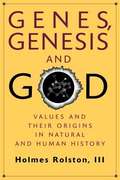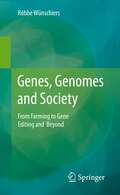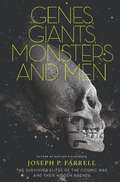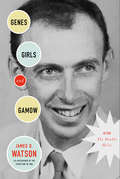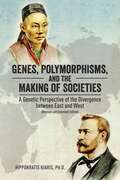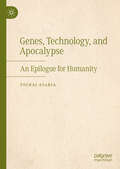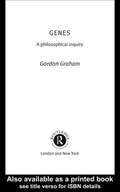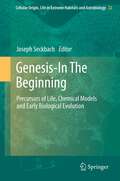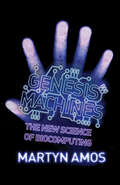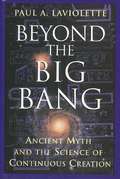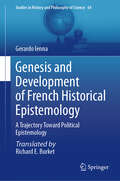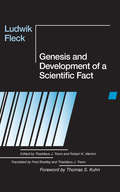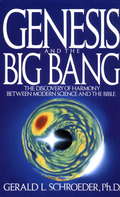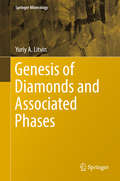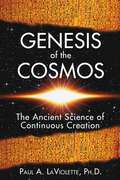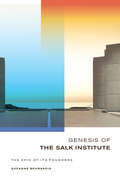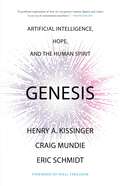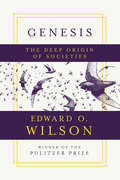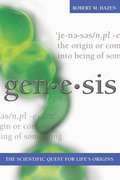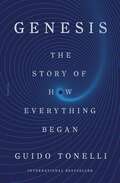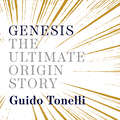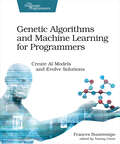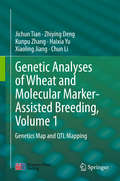- Table View
- List View
Genes, Genesis, and God: Values and Their Origins in Natural and Human History
by Holmes Rolston IIIHolmes Rolston challenges the sociobiological orthodoxy that would naturalize science, ethics, and religion. The book argues that genetic processes are not blind, selfish, and contingent, and that nature is therefore not value-free. The author examines the emergence of complex biodiversity through evolutionary history. Especially remarkable in this narrative is the genesis of human beings with their capacities for science, ethics, and religion. A major conceptual task of the book is to relate cultural genesis to natural genesis. There is also a general account of how values are created and transmitted in both natural and human cultural history. The book is written by one of the most well-respected figures in the philosophy of biology and religion.
Genes, Genomes and Society: From Farming to Gene Editing and Beyond
by Röbbe WünschiersWith CRISPR/Cas gene editing tools in hand, we are currently experiencing a new dimension in genetic engineering. But where should the journey lead? Should we treat diseases or better repair them genetically? Will the new genetic engineering, combined with modern reproductive biology, lead to designer babies? And: May we allow a liberalization of these techniques as citizen science? New methods can precisely alter the genetic material - and they leave no traces. This gene and genome surgery thrives on increasing knowledge about the mode of action of genes, those trait-giving regions in the genome. This knowledge is being applied in practice, particularly in the breeding of more resistant and higher-yielding crops. And what about us? The author shows that gene variants have long been associated not only with diseases, but also with nutritional preferences or intelligence. Therapeutic and optimization options are close at hand. What effect does the environment have on the expression of genetic material? Genes can be shaped during a person's lifetime by the environment, nutrition or experiences and thus passed on to their offspring in a modified form. So, does society have a new form of long-term responsibility for (epi)genetic integrity? In this vividly and comprehensibly written book, the author explains the state of genetic engineering without assuming too much prior knowledge and invites an open dialogue on this ambivalent topic. Get your own idea of the fascinating yet intimidating possibilities of genetic engineering. Where do you stand on the issue? With the help of this book, you have the chance to form a differentiated opinion. This book is a translation of the original German 1st edition Generation Gen-Schere by Röbbe Wünschiers, published by Springer Fachmedien Wiesbaden GmbH, part of Springer Nature in 2019. The translation was done with the help of artificial intelligence (machine translation by the service DeepL.com). The text was subsequently revised by the author. Springer Nature works continuously to further the development of tools for the production of books and on the related technologies to support the authors.
Genes, Giants, Monsters, and Men
by Joseph P. FarrellConsider the possibility that the history of the human race is not as simple as what has been taught in classroom textbooks. Consider the possibility that the evolutionary scientific explanation for mankind has ignored critical facts that are buried deep within the fossils and mankind's DNA. Consider the possibility that the religious stories that have often been the core basis for mankind's understanding of where it belongs in the history of creation may actually reveal a planet occupied with tyrannical giants and an elite highly intelligent race bent on genetic mutation.As horrifying as such possibilities are, Genes, Giants, Monsters, and Men sets forth a plausible theory revealing a hidden history of mankind and a possible reason that it has remained veiled for hundreds of thousands of years. With his well-documented style and breathtaking conclusions, Dr. Joseph P. Farrell pulls back the veil and takes the reader on an odyssey behind the mysterious history and myths of the human race.Joseph P. Farrell is a recognized scholar whose credentials include a PhD in philosophy from the University of Oxford. His literary contribution is a veritable resumé unto itself covering such fields as Nazi Germany, sacred literature, physics, finances, the Giza pyramids, and music theory. A renowned researcher with an eye to assimilate a tremendous amount of background material, Farrell is able to condense the best scholastic research in publication and draw insightful new conclusions on complex and controversial subjects.
Genes, Girls, and Gamow
by James D. WatsonIn the years following his and Francis Crick's towering discovery of DNA, James Watson was obsessed with finding two things: RNA and a wife. Genes, Girls, and Gamow is the marvelous chronicle of those pursuits. Watson effortlessly glides between his heartbreaking and sometimes hilarious debacles in the field of love and his heady inquiries in the field of science. He also reflects with touching candor on some of science's other titans, from fellow Nobelists Linus Pauling and the incorrigible Richard Feynman to Russian physicist George Gamow, who loved whiskey, limericks, and card tricks as much as he did molecules and genes. What emerges is a refreshingly human portrait of a group of geniuses and a candid, often surprising account of how science is done.From the Trade Paperback edition.
Genes, Polymorphisms, and the Making of Societies: A Genetic Perspective of the Divergence between East and West (Revised and Extended Edition)
by Hippokratis KiarisOur genes determine to a large extent who we are and why we are different from others. In this book, Hippokratis Kiaris explores how various genetic polymorphisms in different ethnic populations may affect the development of distinct cultures and eventual
Genes, Technology, and Apocalypse: An Epilogue for Humanity
by Yochai AtariaThis book offers a critique of a certain contemporary discourse in popular science that consists of (1) identifying the origins and therefore essential nature of Homo Sapiens; and (2) identifying the nature of technology. The author’s critique is that this double gesture generates a deterministic worldview – man is evil and technology has its own necessity – that operates to exonerate humanity from responsibility to the horrors of the 20th century, epitomized in Auschwitz and Hiroshima, for example. The author situates this operation within what he identifies as an “apocalyptical-eschatological state of mind”. Yochai Ataria explains that the dynamics of technology and the quest for the first human are the two central vectors shaping both scientific and popular discourse today, highlighting the importance of understanding the deep connection between the two.
Genes: Yeast Gene Analysis (Methods In Microbiology Ser. #Vol. 26)
by Gordon Graham'It's all in the genes'. Is this true, and if so, what is all in the genes? Genes: A Philosophical Inquiry is a crystal clear and highly informative guide to a debate none of us can afford to ignore.Beginning with a much-needed overview of the relationship between science and technology, Gordon Graham lucidly explains and assesses the most important and controversial aspects of the genes debate: Darwinian theory and its critics, the idea of the 'selfish' gene, evolutionary psychology, memes, genetic screening and modification, including the risks of cloning and 'designer' babies.He considers areas often left out of the genes debate, such as the environmental risks of genetic engineering and how we should think about genes in the wider context of debates on science, knowledge and religion. Gordon Graham asks whether genetic engineering might be introducing God back into the debate and whether the risks of a brave new genetic world outweigh the potential benefits.Essential reading for anyone interested in science, technology, and philosophy, Genes: A Philosophical Inquiry is ideal for those wanting to find out more about the ethical implications of genetics and the future of biotechnology.
Genesis - In The Beginning
by Joseph SeckbachGenesis - In The Beginning deals with the origin and diversity of Life and early biological evolution and discusses the question of where (hot or cold sources) and when the beginning of Life took place. Among the sections are chapters dealing with prebiotic chemical processes and considering self-replication of polymers in mineral habitats. One chapter is dedicated to the photobiological regime on early Earth and the emergence of Life. This volume covers the role of symmetry, information and order (homochrial biomolecules) in the beginning of Life. The models of protocells and the genetic code with gene transfer are important topics in this volume. Three chapters discuss the Panspermia hypothesis (to answer "Are we from outer Space?"). Other chapters cover the Astrobiological aspects of Life in the Universe in extraterrestrial Planets of the Solar System and deal with cometary hydrosphere (and its connection to Earth). We conclude with the history and frontiers of Astrobiogy.
Genesis Machines: The New Science of Biocomputing
by Martyn AmosThe paperback version of the groundbreaking book about the next generation of computers: not only are they smaller—they're alive. Cells, gels, and DNA strands are the "wetware" of the twenty-first century. Imagine taking cells from a cancer patient and programming them to detect disease and then prompt the body to cure itself. Or clothes woven with microchips, nanofibers, and living cells to form wearable bio-weapons detection systems. Both of these revolutionary applications are closer than we think. Some scientists are pushing the boundaries even further by creating synthetic biology where brand new creatures are engineered in the laboratory. In this breathtaking book, a leading expert in the field reveals just how the stuff of science fiction is rapidly becoming a reality. This new technology will change the way we think—not just about computers, but about the nature of life itself.
Genesis Of The Cosmos: The Ancient Science of Continuous Creation
by Paul A. LavioletteThe author compares what we know scientifically with ancient myths across time
Genesis and Development of French Historical Epistemology: A Trajectory Toward Political Epistemology (Studies in History and Philosophy of Science #64)
by Gerardo IennaThis book forms an important part of the current revival of the debate around the category of historical epistemology. The term “historical epistemology” designates a methodology or research program aimed at building a historically informed theory of knowledge and/or a history of science and technology that enhances its epistemological aspects. This book offers an original panorama of the French debate surrounding the emergence and consolidation of the intellectual program of historical epistemology over a period ranging from the end of the 19th century to the second half of the 20th century. The first section of this book sets out to reconstruct sociologically and historically the processes of circulation of ideas - both nationally and internationally - that constituted the conditions of possibility for the emergence of the very idea of historical epistemology in the French intellectual context. The second section aims instead to highlight the main theoretical positions - both epistemological and historiographical - that would make it possible to trace a relative unity of intent among the authors who make up the canon of historical epistemology (in their oppositional relationship to other intellectual trends). Particular attention is also paid to defining a “minor canon” of this tradition, represented by what is known as “mathematical thought”. The third part of the volume focuses instead on reconstructing the anthropological, sociological and political perspectives underlying the methodology employed by authors belonging to historical epistemology. The three parts combined make for a uniquely broad yet focused book that is of interest to historians, philosophers and scientists alike.
Genesis and Development of a Scientific Fact
by Robert K. Merton Thaddeus J. Trenn Fred BradleyOriginally published in German in 1935, this monograph anticipated solutions to problems of scientific progress, the truth of scientific fact and the role of error in science now associated with the work of Thomas Kuhn and others. Arguing that every scientific concept and theory--including his own--is culturally conditioned, Fleck was appreciably ahead of his time. And as Kuhn observes in his foreword, "Though much has occurred since its publication, it remains a brilliant and largely unexploited resource." "To many scientists just as to many historians and philosophers of science facts are things that simply are the case: they are discovered through properly passive observation of natural reality. To such views Fleck replies that facts are invented, not discovered. Moreover, the appearance of scientific facts as discovered things is itself a social construction, a made thing. A work of transparent brilliance, one of the most significant contributions toward a thoroughly sociological account of scientific knowledge."--Steven Shapin, Science.
Genesis and Development of a Scientific Fact
by Ludwik Fleck; edited by Thaddeus J. Trenn and Robert K. Merton; translated by Fred Bradley and Thaddeus J. TrennOriginally published in German in 1935, this monograph anticipated solutions to problems of scientific progress, the truth of scientific fact and the role of error in science now associated with the work of Thomas Kuhn and others. Arguing that every scientific concept and theory—including his own—is culturally conditioned, Fleck was appreciably ahead of his time. And as Kuhn observes in his foreword, "Though much has occurred since its publication, it remains a brilliant and largely unexploited resource." "To many scientists just as to many historians and philosophers of science facts are things that simply are the case: they are discovered through properly passive observation of natural reality. To such views Fleck replies that facts are invented, not discovered. Moreover, the appearance of scientific facts as discovered things is itself a social construction, a made thing. A work of transparent brilliance, one of the most significant contributions toward a thoroughly sociological account of scientific knowledge."—Steven Shapin, Science
Genesis and the Big Bang Theory: The Discovery Of Harmony Between Modern Science And The Bible
by Gerald SchroederIn this groundbreaking book, physicist Gerald Schroeder takes on skeptics from both sides of the cosmological debate, arguing that science and the Bible are not at odds concerning the origin of the universe.From the Trade Paperback edition.
Genesis of Diamonds and Associated Phases (Springer Mineralogy)
by Yuriy A. LitvinThis book presents an overview of recent advances in our understanding of the genesis of diamonds and the associated phases. It is divided into three main parts, starting with an introduction to the analysis of diamond inclusions to infer the formation processes. In turn, the second part of the book presents high-pressure experimental studies in mantle diamond-parental mineral systems with representative multicomponent boundary compositions. The experimental syngenesis phase diagrams provided reveal the physicochemical mechanisms of diamond nucleation and substantiate the mantle-carbonatite concept of the genesis of diamonds and associated phases. Lastly, the book describes the genetic classification of diamond-hosted mineral inclusions and experimentally determined RE “mineral-parental melt” partition coefficients. The physicochemical experimental evidence presented shows the driving forces behind the fractional evolution of the mantle magmas and diamond-parental melts.Given the depth and breadth of its coverage, the book offers researchers essential new insights into the ways diamonds and associated minerals and rocks are naturally created.
Genesis of Symbolic Thought
by Alan BarnardSymbolic thought is what makes us human. Claude Lévi-Strauss stated that we can never know the genesis of symbolic thought, but in this powerful new study Alan Barnard argues that we can. Continuing the line of analysis initiated in Social Anthropology and Human Origins (Cambridge University Press, 2011), Genesis of Symbolic Thought applies ideas from social anthropology, old and new, to understand some of the areas also being explored in fields as diverse as archaeology, linguistics, genetics and neuroscience. Barnard aims to answer questions including: when and why did language come into being? What was the earliest religion? And what form did social organization take before humanity dispersed from the African continent? Rejecting the notion of hunter-gatherers as 'primitive', Barnard hails the great sophistication of the complex means of their linguistic and symbolic expression and places the possible origin of symbolic thought at as early as 130,000 years ago.
Genesis of the Cosmos: The Ancient Science of Continuous Creation
by Paul A. LavioletteProvides compelling evidence that creation myths from the dawn of civilization correspond to cutting edge astronomical discoveries • Exposes the contradictions in current cosmological theory and offers a scientific basis for the ancient myths and esoteric lore that encode a theory of continuous creation• By the scientist who was the first to disprove the Big Bang theory on the basis of observational dataRecent developments in theoretical physics, including systems theory and chaos theory, are challenging long-held mechanistic views of the universe. Many thinkers have speculated that the remnants of an ancient science survive today in mythology and esoteric lore, but until now the scientific basis for this belief has remained cloaked in mystery. Paul LaViolette reveals the remarkable parallels between the cutting edge of scientific thought and creation myths from the dawn of civilization. With a scientific sophistication rare among mythologists, LaViolette deciphers the forgotten cosmology of ancient lore in a groundbreaking scientific tour de force. In direct, nontechnical language, he shows how these myths encode a theory of cosmology in which matter is continually growing from seeds of order that emerge spontaneously from the surrounding subquantum chaos.Exposing the contradictions that bedevil the big bang theory, LaViolette offers both the specialist and the general reader a controversial and highly stimulating critique of prevailing misconceptions about the seldom-questioned superiority of modern science over ancient cosmology. By restoring and reanimating this ancient scientific worldview, Genesis of the Cosmos leads us beyond the restrictive metaphors of modern science and into a new science for the 21st century.
Genesis of the Salk Institute
by Suzanne BourgeoisThis work is a personal account of the origins and early years of the Salk Institute for Biological Studies. Bourgeois crafts an engaging study that draws on her involvement with the Institute and on related archives, interviews, and informal conversations.The volume discusses the people who founded the Institute and built a home for renowned research--leading scientists of the time as well as non-scientists of stature in finance, politics, philanthropy, publishing, and the humanities. The events that brought people together, the historic backdrop in which they worked, their personalities, their courage and their visions, their clash of egos and their personal vanities are woven together in a rich, engaging narrative about the founding of a world-premier research institution.
Genesis: Artificial Intelligence, Hope, and the Human Spirit
by Henry A. Kissinger Eric Schmidt Craig MundieIn his final book, the late Henry Kissinger joins forces with two leading technologists to mount &“a profound exploration&” (Walter Isaacson) of the epochal challenges and opportunities presented by the revolution in Artificial Intelligence: a breakthrough that dramatically empowers people in all walks of life while also raising urgent questions about the future of humanity. As it absorbs data, gains agency, and intermediates between humans and reality, AI (Artificial Intelligence) will help us to address enormous crises, from climate change to geopolitical conflicts to income inequality. It might well solve some of the greatest mysteries of our universe and elevate the human spirit to unimaginable heights. But it will also pose challenges on a scale and of an intensity that we have never seen—usurping our power of independent judgment and action, testing our relationship with the divine, and perhaps even spurring a new phase in human evolution. The last book of elder statesman Henry Kissinger, written with technologists Craig Mundie and Eric Schmidt, Genesis charts a course between blind faith and unjustified fear as it outlines an effective strategy for navigating the age of AI.
Genesis: The Deep Origin Of Societies
by Edward O. WilsonForming a twenty-first-century statement on Darwinian evolution, one shorn of “religious and political dogma,” Edward O. Wilson offers a bold work of scientific thought and synthesis. Asserting that religious creeds and philosophical questions can be reduced to purely genetic and evolutionary components, and that the human body and mind have a physical base obedient to the laws of physics and chemistry, Genesis demonstrates that the only way for us to fully understand human behavior is to study the evolutionary histories of nonhuman species. Of these, Wilson demonstrates that at least seventeen—among them the African naked mole rat and the sponge- dwelling shrimp—have been found to have advanced societies based on altruism and cooperation. Whether writing about midges who “dance about like acrobats” or schools of anchovies who protectively huddle “to appear like a gigantic fish,” or proposing that human society owes a debt of gratitude to “postmenopausal grandmothers” and “childless homosexuals,” Genesis is a pithy yet path-breaking work of evolutionary theory, braiding twenty-first-century scientific theory with the lyrical biological and humanistic observations for which Wilson is known.
Genesis: The Scientific Quest for Life's Origin
by Robert M. HazenLife on Earth arose nearly 4 billion years ago, bursting forth from air, water, and rock. Though the process obeyed all the rules of chemistry and physics, the details of that original event pose as deep a mystery as any facing science. How did non-living chemicals become alive? While the question is (deceivingly) simple, the answers are unquestionably complex. Science inevitably plays a key role in any discussion of life's origins, dealing less with the question of why life appeared on Earth than with where, when, and how it emerged on the blasted, barren face of our primitive planet. Astrobiologist Robert Hazen has spent many years dealing with the fundamental questions of life's genesis. As an active research scientist, he is down deep in all the messy details that science has to offer on the subject, tracing the inexorable sequence of events that led to the complicated interactions of carbonbased molecules. As he takes us through the astounding process of emergence, we are witness to the first tentative steps toward life--from the unfathomable abundance of carbon biomolecules synthesized in the black vacuum of space to the surface of the Earth to deep within our planet's restless crust. We are privy to the breathtaking drama that rapidly unfolds as life prevails. The theory of emergence is poised to answer a multitude of questions--even as it raises the possibility that natural processes exist beyond what we now know, perhaps beyond what we even comprehend. Genesis tells the tale of transforming scientific advances in our quest for life's origins. Written with grace, beauty, and authority, it goes directly to the heart of who we are and why we are here.
Genesis: The Story of How Everything Began
by Guido TonelliA breakout bestseller in Italy, now available for American readers for the first time, Genesis: The Story of How Everything Began is a short, humanistic tour of the origins of the universe, earth, and life—drawing on the latest discoveries in physics to explain the seven most significant moments in the creation of the cosmos.Curiosity and wonderment about the origins of the universe are at the heart of our experience of the world. From Hesiod’s Chaos, described in his poem about the origins of the Greek gods, Theogony, to today’s mind-bending theories of the multiverse, humans have been consumed by the relentless pursuit of an answer to one awe inspiring question: What exactly happened during those first moments?Guido Tonelli, the acclaimed, award-winning particle physicist and a central figure in the discovery of the Higgs boson (the “God particle”), reveals the extraordinary story of our genesis—from the origins of the universe, to the emergence of life on Earth, to the birth of human language with its power to describe the world. Evoking the seven days of biblical creation, Tonelli takes us on a brisk, lively tour through the evolution of our cosmos and considers the incredible challenges scientists face in exploring its mysteries. Genesis both explains the fundamental physics of our universe and marvels at the profound wonder of our existence.
Genesis: The Ultimate Origin Story
by Guido TonelliWhat if the ancient Greeks were right, and the universe really did spring into being out of chaos and the void? How could we know? And what must its first moments have been like?To answer these questions, scientists are delving into all the hidden crevices of creation. Armed with giant telescopes and powerful particle accelerators, they probe the subtle mechanisms by which our familiar world came to be, and try to foretell the manner in which it will end.The result of all this collective effort is a complex story, stranger at times than even our most ancient creation myths. But its building blocks give us the power to work marvels our predecessors could scarcely comprehend. In Genesis, the CERN physicist and bestselling author Guido Tonelli sets out to do justice to that great story.
Genetic Algorithms and Machine Learning for Programmers
by Frances BuontempoSelf-driving cars, natural language recognition, and online recommendation engines are all possible thanks to Machine Learning. Now you can create your own genetic algorithms, nature-inspired swarms, Monte Carlo simulations, cellular automata, and clusters. Learn how to test your ML code and dive into even more advanced topics. If you are a beginner-to-intermediate programmer keen to understand machine learning, this book is for you. Discover machine learning algorithms using a handful of self-contained recipes. Build a repertoire of algorithms, discovering terms and approaches that apply generally. Bake intelligence into your algorithms, guiding them to discover good solutions to problems. In this book, you will: Use heuristics and design fitness functions.Build genetic algorithms.Make nature-inspired swarms with ants, bees and particles.Create Monte Carlo simulations.Investigate cellular automata.Find minima and maxima, using hill climbing and simulated annealing.Try selection methods, including tournament and roulette wheels.Learn about heuristics, fitness functions, metrics, and clusters. Test your code and get inspired to try new problems. Work through scenarios to code your way out of a paper bag; an important skill for any competent programmer. See how the algorithms explore and learn by creating visualizations of each problem. Get inspired to design your own machine learning projects and become familiar with the jargon. What You Need: Code in C++ (>= C++11), Python (2.x or 3.x) and JavaScript (using the HTML5 canvas). Also uses matplotlib and some open source libraries, including SFML, Catch and Cosmic-Ray. These plotting and testing libraries are not required but their use will give you a fuller experience. Armed with just a text editor and compiler/interpreter for your language of choice you can still code along from the general algorithm descriptions.
Genetic Analyses of Wheat and Molecular Marker-Assisted Breeding, Volume 1
by Chun Li Jichun Tian Zhiying Deng Kunpu Zhang Haixia Yu Xiaoling JiangThe book mainly describes the QTL mappings and efficacy analyses that are associated with wheat productivity, quality, physiology and various stress resistances and provides summaries of results from studies conducted both at home and abroad. It presents comparable data and analyses, helping readers to arrive at a more comprehensive understanding of the latest development in this field. The book provides a wealth of novel information, broad range of applications and in-depth findings on crop genetics and molecular breeding, making it valuable not only for plant breeders but also for academic faculties, senior researchers and advanced graduate students who are involved in plant breeding and genetics. Dr. Jichun Tian is a professor at the Department of Agronomy, Shandong Agricultural University, Tai'an, China.
